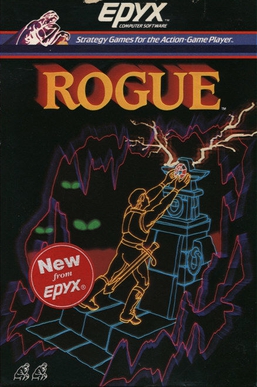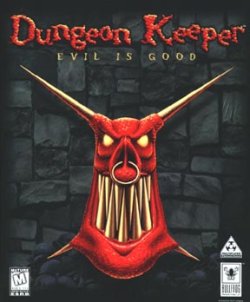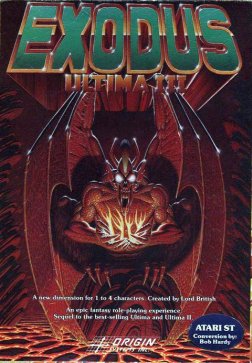A massively multiplayer online role-playing game (MMORPG) is a video game that combines aspects of a role-playing video game and a massively multiplayer online game.

Roguelike is a subgenre of role-playing computer games traditionally characterized by a dungeon crawl through procedurally generated levels, turn-based gameplay, grid-based movement, and permanent death of the player character. Most roguelikes are based on a high fantasy narrative, reflecting their influence from tabletop role playing games such as Dungeons & Dragons.

Rogue is a dungeon crawling video game by Michael Toy and Glenn Wichman with later contributions by Ken Arnold. Rogue was originally developed around 1980 for Unix-based minicomputer systems as a freely distributed executable. It was later included in the official Berkeley Software Distribution 4.2 operating system (4.2BSD). Commercial ports of the game for a range of personal computers were made by Toy, Wichman, and Jon Lane under the company A.I. Design and financially supported by the Epyx software publishers. Additional ports to modern systems have been made since by other parties using the game's now-open source code.

Pool of Radiance is a role-playing video game developed and published by Strategic Simulations, Inc (SSI) in 1988. It was the first adaptation of TSR's Advanced Dungeons & Dragons (AD&D) fantasy role-playing game for home computers, becoming the first episode in a four-part series of D&D computer adventure games. The other games in the "Gold Box" series used the game engine pioneered in Pool of Radiance, as did later D&D titles such as the Neverwinter Nights online game. Pool of Radiance takes place in the Forgotten Realms fantasy setting, with the action centered in and around the port city of Phlan.

A role-playing video game, commonly referred to as a role-playing game (RPG) or computer role-playing game (CRPG), is a video game genre where the player controls the actions of a character immersed in some well-defined world, usually involving some form of character development by way of recording statistics. Many role-playing video games have origins in tabletop role-playing games and use much of the same terminology, settings and game mechanics. Other major similarities with pen-and-paper games include developed story-telling and narrative elements, player character development, complexity, as well as replay value and immersion. The electronic medium removes the necessity for a gamemaster and increases combat resolution speed. RPGs have evolved from simple text-based console-window games into visually rich 3D experiences.

Dungeon Keeper is a strategy video game developed by Bullfrog Productions and released by Electronic Arts in June 1997 for MS-DOS and Windows 95. In Dungeon Keeper, the player builds and manages a dungeon, protecting it from invading 'hero' characters intent on stealing accumulated treasures, killing monsters and ultimately the player's demise. The ultimate goal is to conquer the world by destroying the heroic forces and rival dungeon keepers in each realm. A character known as the Avatar appears as the final hero. Dungeon Keeper uses Creative Technology's SoundFont technology to enhance its atmosphere. Multiplayer with up to four players is supported using a modem, or over a local network.
Guild Wars is an online role-playing game franchise developed by ArenaNet and published by NCSOFT. The games were critically well received and won many editor's choice awards, as well as awards such as Best Value, Best Massively Multiplayer Online Role-Playing Game (MMORPG), and Best Game. Guild Wars was noted for being the "first major MMO to adopt a business model not based on monthly subscription fees", its instanced approach to gameplay, and the quality of the graphics and play for computers with low specifications. In April 2009, NCSoft announced that 6 million units of games in the Guild Wars series had been sold. The sequel and fourth major entry into the series, Guild Wars 2, was announced in March 2007 and released on August 28, 2012. It features updated graphics and gameplay mechanics, and continues the original Guild Wars tradition of no subscription fees. The Guild Wars series had sold 11.5 million copies by August 2015

Meridian 59 is a 1996 video game developed by Archetype Interactive and published by The 3DO Company. It was the first 3D graphical massively multiplayer online role-playing game (MMORPG) and one of the longest running original online role-playing games. The development team included John Hanke, who later founded Niantic, Inc. and codeveloped Google Earth and Pokémon Go.

Ultima III: Exodus is the third game in the series of Ultima role-playing video games. Exodus is also the name of the game's principal antagonist. It is the final installment in the "Age of Darkness" trilogy. Released in 1983, it was the first Ultima game published by Origin Systems. Originally developed for the Apple II, Exodus was eventually ported to 13 other platforms, including a NES/Famicom remake.

The Bard's Tale II: The Destiny Knight is a fantasy role-playing video game created by Interplay Productions in 1986. It is the first sequel to The Bard's Tale, and the last game of the series that was designed and programmed by Michael Cranford.

Greyhawk Adventures is an accessory for the Advanced Dungeons & Dragons (AD&D) World of Greyhawk campaign setting.

The Lord of the Rings Online is a massively multiplayer online role-playing game (MMORPG) for Microsoft Windows and OS X set in J. R. R. Tolkien's Middle-earth, taking place during the time period of The Lord of the Rings. Originally developed by Turbine, the game launched in North America, Australia, Japan, and Europe in April 2007 as The Lord of the Rings Online: Shadows of Angmar. Players could create characters of four races and seven classes and adventure throughout the region of Eriador. In November 2008, Mines of Moria expansion was released, adding the region of Moria and two new playable classes. It was followed by the Siege of Mirkwood in December 2009. In 2010 the game underwent a shift from its original subscription-based payment model to being free-to-play.

Dungeons & Dragons: Shadow over Mystara is an arcade game developed and published by Capcom in 1996 as a sequel to Dungeons & Dragons: Tower of Doom. The game is set in the Dungeons & Dragons campaign setting of Mystara.
Avatar is an early graphics-based multi-user highly interactive Role-playing video game, created on the University of Illinois' PLATO system in the late 1970s. It has graphics for navigating through a dungeon and chat-style text for player status and communication with others. It can currently be played online via Cyber1 or a simulation called Javatar. What makes Avatar popular is the high level of interactivity with other players and the sense of community that develops. Development on Avatar began on the University of Illinois PLATO system around 1976 by Bruce Maggs and Andrew Shapira, who were junior high school students at the time. They were soon joined by David Sides, who was a student at the University of Illinois. The first version was released in 1979.

Al-Qadim: The Genie's Curse is an action role-playing game for the personal computer set in the Al-Qadim campaign setting of Advanced Dungeons and Dragons. The game was developed by Cyberlore Studios and published in 1994 by Strategic Simulations (SSI). The game combines role-playing game and adventure with a simplified interface; the player's character is a young corsair trying to clear his family's name, rescue his betrothed and determine who has been freeing genies from their masters.

Monster Mythology, published by TSR in 1992, is a sourcebook about non-human deities that can be used in fantasy role-playing games using the second edition rules for Advanced Dungeons & Dragons (AD&D).

Dungeon Crawl Stone Soup (DCSS) is a free and open source roguelike computer game and the community-developed successor to the 1997 roguelike game Linley's Dungeon Crawl, originally programmed by Linley Henzell. It has been identified as one of the "major roguelikes" by John Harris.

Demise: Rise of the Ku'tan is a medieval fantasy role-playing video game released in 2000 for Microsoft Windows, developed by Artifact Entertainment and published by IPC Software. The game features the same setting as Mordor: The Depths of Dejenol, which was also developed by designer David Allen.

Rappelz is a free-to-play massively multiplayer online role-playing game. The game is developed by the Korean company Gala Lab, formerly nFlavor. It is published in Europe and North America by Way2Bit Co. Ltd. in English, French, German, Italian, Polish and Turkish, on their Bora Island games portal. As of October 2008, Rappelz was also being published by the South East Asia based game publishing company AsiaSoft as RappelzSEA but was later dropped by the company on 1 September 2009. The game was also published in Arabic for MENA gamers by the Emirati company Game Power 7. The game was released under a different title known as Hope of Nations, and was commercially launched on 16 March 2009. A new version was released 15 July 2010 by EagleGame in the Philippines, but the PH/SEA version closed in 2016. As of 6 February 2013 it was confirmed by Rappelz GMs that "Gala Net, Inc. and its subsidiaries Gala Networks Europe and Gala-Net Brazil have been acquired by Webzen, Inc.", however, it is still being developed by Gala Labs and Gala Japan

David Allen is a video game designer and entrepreneur who is most recently known as the creator of Alganon, a fantasy based MMORPG developed by Quest Online, a company he co-founded in 2006.

















